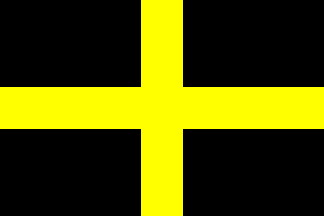St. Dewi

Ireland is not the only Celtic country that has an apostolic archbishop as its patron saint. So has Cymru (Wales), across the Irish Sea. He is St. Dewi or David (520 - 589).
A native of Wales, born it is said to a princely family of Pembrokeshire, Dewi undertook a monastic vocation, and was educated at Henfynyw in Cardinganshire, possibly under St. Illtud. After ordination he spent several further years of study under St. Paulinus of Wales. After that he began to course about west Britain, establishing, it is said, many monasteries. Eventually he set up his own monastery at Menevia, on the remote western shore of Pembrokeshire. The name of Menevia was later changed to St. David's.
Actually, not much is known in detail about this monk's life. It is not surprising, in a sense, for he lived in the age and the countryside of King Arthur, whose life story is likewise suffused with the legendary mists of ancient Wales. Along the line, because of his fame as a monastic leader, David was chosen bishop of Caerleon (supposed site of Arthur's castle). He said he would accept only if the diocesan see were removed from Caerleon to his monastery, St. David's. He won, and St. David's eventually became the metropolitan see of Wales. It was not so out-of-the-way as presumed, for its harbor became a busy port-of-call for pilgrims en route to Rome and Canterbury. David, meanwhile, is said to have been a very zealous bishop/archbishop.
The main reason why St. David had won fame as a monastic founder is that he had enforced in his abbeys a very strict rule of life. Apparently the Welsh monks, like their Irish brothers, enjoyed the challenge of stringent penance. St. Gildas, a leading British monk, although also a Celt, once observed that the Welsh monks were sometimes more abstemious than Christian. When a man applied for admission to the monastery, the monks, to test him, kept him at the monastery gate for ten days, and even made a point of addressing him harshly. Dewi's monks also maintained a strict vigil from Friday to dusk to Sunday dawn, breaking the weekend cycle of prayer for only one hour of sleep. The monks could speak only when necessity demanded, and prayed constantly, even while at work. Bread, vegetables and salt were their only foods. Water (sometimes mixed with a bit of milk) was their only drink. St. David was nicknamed "The Waterman" because of his veto of any other beverage. Really hard labor was their regular practice, and they were not allowed to have any cattle lest they be tempted to hitch them to the plow to turn the soil more easily. The reason for this rigorous program was David's desire to emulate the original Christian hermits of the Egyptian desert. His disciples would ask, quite reasonably, why if the desert fathers could grow holy through such a regime, they themselves could not.
Archbishop David continued to head his archdiocese for many years, and he ruled it well. He won a reputation as a wonderful example to all. When he died, St. Kentigern is said to have seen angels bearing his soul to heaven. He left no writings, but a stellar tradition. It was perhaps summarized in his last words: "Be joyful, brothers and sisters. Keep your faith, and do the little things that you have seen and done with me."
Legend says that when St. David was once speaking at Brefi, a snow-white dove perched on his shoulder, and the earth beneath his feet rose into a little hill, so as to give him a pulpit from which he could easily be heard. In pictures he is represented thus: dove on the shoulder, feet on the mound. St. David's Day (March 1) became a national Welsh cultural holiday, and still remains so. Canonized, it is said, in 1120, David's name was given to over 50 churches in south Wales. After 1398 he was likewise on the liturgical calendar of the whole Catholic province of Canterbury, and is still commemorated by today's Catholic dioceses of Wales (Cardiff and Menevia), and those of Westminster and Portsmouth.
So when you see people of Welsh background on March 1, say to them, "Gorau ar Ddydd Gwyl Dewi!" That is Cymric for "Greetings on St. David's Day!" (I think.)
~ Father Robert F. McNamara


0 Comments:
Post a Comment
<< Home